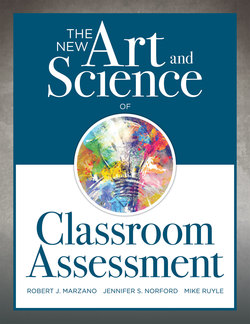Читать книгу The New Art and Science of Classroom Assessment - Robert J Marzano - Страница 4
На сайте Литреса книга снята с продажи.
ОглавлениеTable of Contents
About the Authors
Preface
Introduction: The New Paradigm for Classroom Assessment
The Precision of Externally Designed Assessments
Multiple Assessments
The New View of Summative Scores
The Need for Proficiency Scales
This Book
1 The Assessment-Friendly Curriculum
The Problem With Standards
Standards as Inconsequential
The Assessment Focus of Standards
A Small List of Measurement Topics
The New Art and Science of Classroom Assessment in Practice
2 Proficiency Scales
Dysfunctional Variations of a Proficiency Scale
Proficiency Scales for Declarative Knowledge
Proficiency Scales for Mental Procedural Knowledge
Proficiency Scales for Psychomotor Procedural Knowledge
The New Art and Science of Classroom Assessment in Practice
3 Parallel Assessments
A Brief History of Parallel Assessments
Taxonomies
Proficiency Scale Use for Scoring Traditional Tests
Aberrant Patterns
Proficiency Scale Use for Scoring Essays
Proficiency Scale Use for Scoring Performance Assessments
The Role of Collaborative Teams in Designing Parallel Assessments
The New Art and Science of Classroom Assessment in Practice
4 The Measurement Process and Different Types of Assessments
Assessment for Declarative and Procedural Knowledge
Types of Classroom Assessments
Student-Led Assessments
Measurement With Only One Level of the Scale
Proficiency Scales With Multiple Score 3.0 Elements
Supplemental Topics
Quarter-Point Intervals
Instructional Feedback
The New Art and Science of Classroom Assessment in Practice
5 Summative Scores
A Brief History of Formative and Summative Assessments
The Method of Mounting Evidence
The Method of Mathematical Models
The Best-Fit Model
The Decaying Average and Other Mathematical Models
The New Art and Science of Classroom Assessment in Practice
6 Non-Subject-Specific Skills
Cognitive Analysis Skills
Knowledge-Application Skills
Metacognitive Skills
General Behavior Skills
The New Art and Science of Classroom Assessment in Practice
7 Record Keeping and Reporting
Keeping a Record
Keeping a Record Using Technology
Reporting the Overall Grade
Revisiting the System of Assessments
The New Art and Science of Classroom Assessment in Practice
Epilogue: School Change and Classroom Change
Appendix A: Types of Declarative Content
Specific People or Types of People
Specific Organizations and Groups or Types of Organizations and Groups
Specific Intellectual or Artistic Products or Types of Intellectual or Artistic Products
Naturally Occurring Objects
Naturally Occurring Places
Specific Animals or Types of Animals
Manmade Objects
Manmade Places
Naturally Occurring Phenomena or Events
Manmade Phenomena or Events
Appendix B: Types of Test-Response Items
Selected-Response Items
Constructed-Response Items
References and Resources
Index
